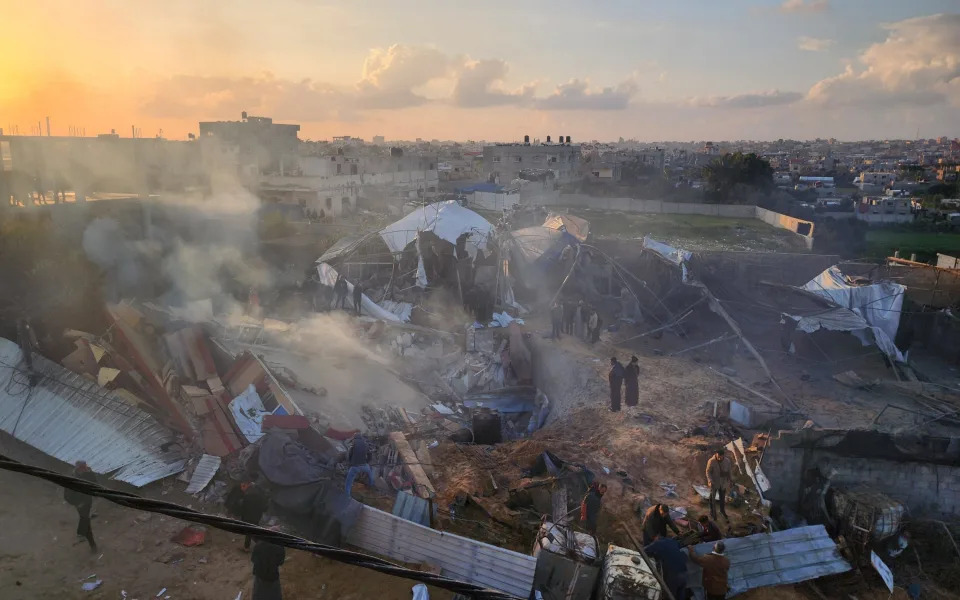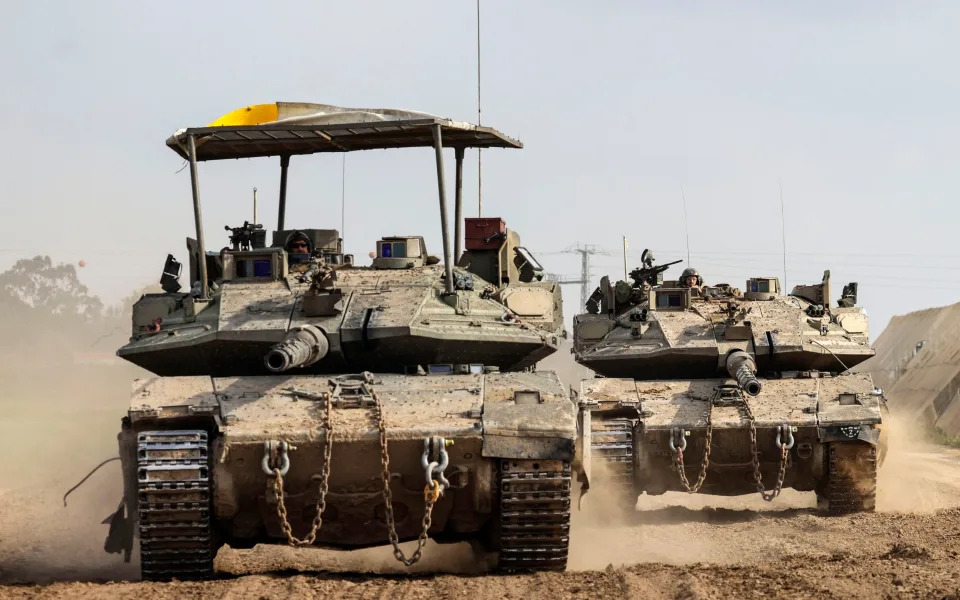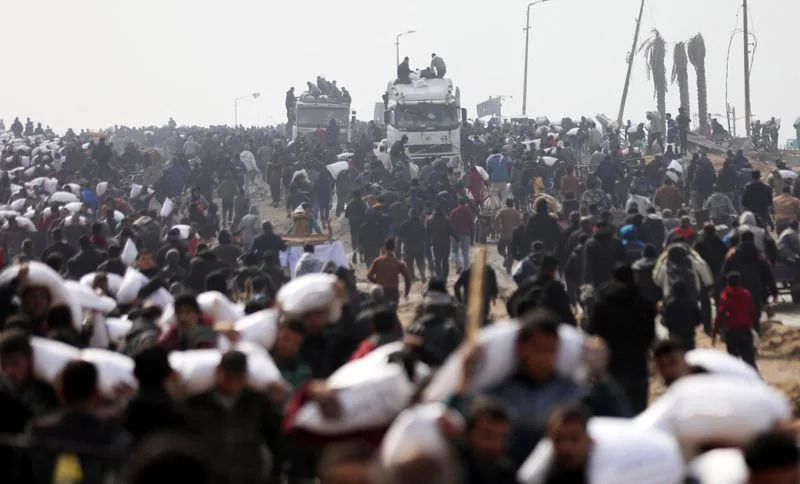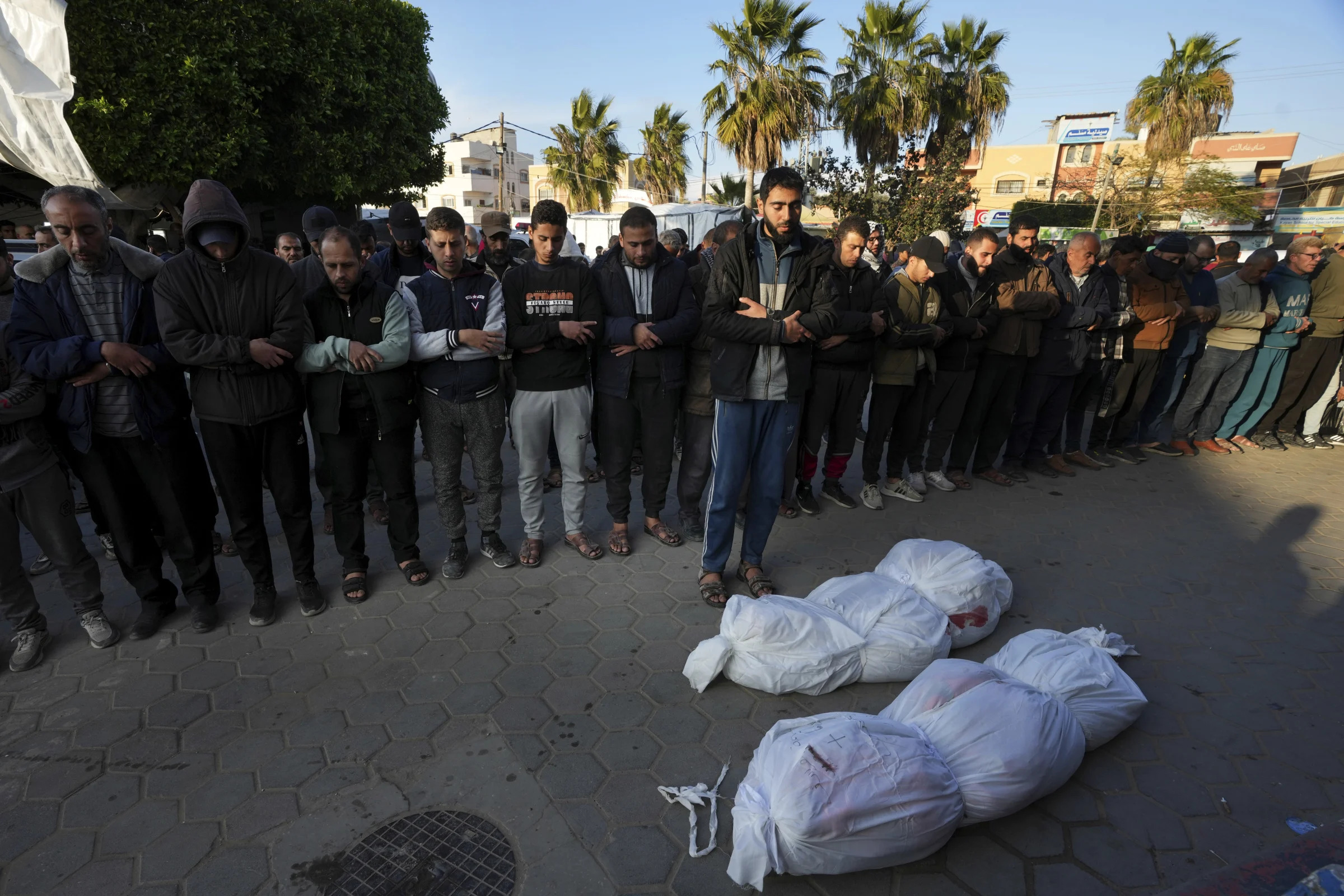The United States has proposed a rival draft United Nations Security Council resolution calling for a temporary ceasefire in the Israel-Hamas war and opposing a major ground offensive by its ally Israel in Rafah, according to the text seen by Reuters.
Palestinians carry bags of flour they grabbed from an aid truck near an Israeli checkpoint in Gaza City.
The move comes after the U.S. signalled it would veto on Tuesday an Algerian-drafted resolution — demanding an immediate humanitarian ceasefire — over concerns it could jeopardize talks between the U.S., Egypt, Israel and Qatar that seek to broker a pause in the war and the release of hostages held by Hamas.
Until now, Washington has been averse to the word ceasefire in any U.N. action on the Israel-Hamas war, but the U.S. text echoes language that President Joe Biden said he used last week in conversations with Israeli Prime Minister Benjamin Netanyahu.
"We do not plan to rush our text to a vote. We don't believe a rush to a vote is necessary or constructive and intend on allowing time for negotiations," a senior U.S. administration official, speaking on condition of anonymity, said on Monday.
To pass, a resolution needs at least nine votes in favor and no vetoes by the U.S., France, Britain, Russia or China.
The U.S. draft text "determines that under current circumstances a major ground offensive into Rafah would result in further harm to civilians and their further displacement including potentially into neighboring countries."
Israel plans to storm Rafah, where more than 1 million of the 2.3 million Palestinians in Gaza have sought shelter, prompting international concern that an assault would sharply worsen the humanitarian crisis in Gaza. The U.N. has warned it "could lead to a slaughter."
The draft U.S. resolution says such a move "would have serious implications for regional peace and security, and therefore underscores that such a major ground offensive should not proceed under current circumstances."
Washington traditionally shields Israel from U.N. action and has twice vetoed council resolutions since the Oct. 7 attack on Israel by Hamas militants. But it has also abstained twice, allowing the council to adopt resolutions that aimed to boost aid to Gaza and called for extended pauses in fighting.
'WARNING SHOT'
This is the second time since Oct. 7 that Washington has proposed a Security Council resolution on Gaza. Russia and China vetoed its first attempt in late October.
While the U.S. was ready to protect Israel by vetoing the Algerian draft resolution on Tuesday, International Crisis Group U.N. Director Richard Gowan said Israel would be more concerned by the text Washington drafted.
"The simple fact that the U.S. is tabling this text at all is a warning shot for Netanyahu," he said. "It is the strongest signal the U.S. has sent at the U.N. so far that Israel cannot rely on American diplomatic protection indefinitely."
Israel's mission to the United Nations in New York did not immediately respond to a request for comment on the U.S. draft.
A second senior U.S. administration official, speaking on condition of anonymity, said the U.S. draft does not suggest "anything about the dynamics of any particular relationship, whether that's with the Israelis or any other partner we have."
The draft U.S. text would condemn calls by some Israeli government ministers for Jewish settlers to move to Gaza and would reject any attempt at demographic or territorial change in Gaza that would violate international law.
The resolution would also reject "any actions by any party that reduce the territory of Gaza, on a temporary or permanent basis, including through the establishment officially or unofficially of so-called buffer zones, as well as the widespread, systematic demolition of civilian infrastructure."
Reuters reported in December that Israel told several Arab states that it wants to carve out a buffer zone inside Gaza's borders to prevent attacks after the war ends.
The war began when fighters from the Hamas militant group that runs Gaza attacked Israel on Oct. 7, killing 1,200 people and capturing 253 hostages, according to Israeli tallies. In retaliation, Israel launched a military assault on Gaza that health authorities say has killed nearly 29,000 Palestinians with thousands more bodies feared lost amid the ruins.
In December, more than three-quarters of the 193-member U.N. General Assembly voted to demand an immediate humanitarian ceasefire. General Assembly resolutions are not binding but carry political weight, reflecting a global view on the war.
US moves to stop Israel’s invasion of Rafah
Rafah has become home to more than one million displaced Palestinians -
The US said on Monday night that Israel’s planned invasion of Rafah “should not proceed under current circumstances” as it sought to use the UN to halt fighting.
Joe Biden is pushing for a United Nations vote on a “temporary ceasefire” in a break with the Israeli government as its troops prepare for an assault on the city, in south Gaza.
In a draft resolution, the US warns that a ground offensive into the city, where more than one million Palestinians are sheltering, would have “serious implications for regional peace and security”.
The move comes as Israel has rebuffed efforts by frustrated Western allies to call off its planned invasion of Rafah, the only remaining city controlled by Hamas.
It marks a departure from America’s initial position at the UN that Israel has the right to defend itself. Washington has twice vetoed council resolutions for a ceasefire in Gaza since the Hamas terror attack on Oct 7.
Mr Biden has raised concerns both privately and in public that Israel must create a plan to ensure the safety of the civilians sheltering in Rafah. US media reported that the president was considering a “breach” in the relationship with Israel.
US diplomats circulated its draft resolution on Monday after America rejected a rival Arab-backed vote for an end to fighting due to take place on Tuesday.
The US plan has not been scheduled for a vote, but is likely to be backed by the Security Council’s permanent members, including the UK.
It calls for a temporary ceasefire “as soon as practicable” alongside the lifting of blockades to aid delivery, and also demands Hamas releases all its hostages.
On Monday, Israel gave Hamas until March 10, the beginning of Ramadan, to hand over all hostages held in Gaza or it would order the ground assault on Rafah.
Around 1.4 million Palestinians, most of whom have been pushed from their homes in the north by Israel’s ground operations, are believed to be sheltering in the Gazan city on the Egyptian border.
On Monday, Benny Gantz, a member of the Israeli war cabinet, said: “To those saying the price [of an offensive] is too high, I say this very clearly: Hamas has a choice – they can surrender, release the hostages, and the citizens of Gaza will be able to celebrate the holy holiday of Ramadan.”
The Biden administration has reportedly urged Israel to finish the war by Ramadan, fearing that hostilities around the holiday could antagonise Muslims across the world.
It comes as international pressure on Israel continues to mount, with 26 out of 27 EU countries calling for an “immediate humanitarian pause that would lead to a sustainable ceasefire”.
Josep Borrell, the EU’s foreign policy chief, did not disclose which country had abstained, but Hungary reportedly blocked a similar initiative earlier.

Meanwhile, Sir Keir Starmer is under fierce pressure to back calls for an immediate ceasefire as he faces the threat of a fresh Labour rebellion over Gaza.
The party leader, who has been urged by Left-wing backbenchers to call for an end to the war, is braced for one of the toughest tests of his time in office on Wednesday when MPs vote for a second time on whether to support a truce.
He is widely expected to table his own amendment to an SNP motion in an attempt to see off a mutiny, but no final decision had been made as of Monday night.
The draft US text cited by Reuters urges “support for a temporary ceasefire in Gaza as soon as practicable”.
“Under current circumstances, a major ground offensive into Rafah would result in further harm to civilians and their further displacement including potentially into neighbouring countries,” it says, warning that the offensive was fraught with “serious implications for regional peace and security”.
The resolution would also reject “any actions by any party that reduce the territory of Gaza”, referring to the “buffer zone” Israel is building around the border area.

It was not immediately clear when or whether the draft resolution would be put to a vote in the 15-member council. To be adopted, a resolution needs at least nine votes in favour and no vetoes by the US, France, Britain, Russia or China.
The move appears to be a response to the move by Algeria on Saturday to request a Security Council vote later this week on its draft resolution demanding a ceasefire in Gaza.
Linda Thomas-Greenfield, the US ambassador to the UN, quickly signalled that it would be vetoed because it could jeopardise “sensitive negotiations” on hostages.
Unicef, the UN’s children’s agency, warned on Monday against the offensive as it called Rafah one of the most densely populated places on the planet. “They must be protected. They have no safe place to go,” it said.
Meanwhile, UN rights experts called for an independent investigation into alleged Israeli abuses targeted against Palestinian women and girls in the Gaza Strip and the West Bank, including killings, rapes and sexual assault.
The statement by the seven independent UN experts prompted an angry reaction from Israel, which rejected the “despicable and unfounded claims”.
Israel strikes across Gaza as US says it will block another UN resolution
Israeli strikes across Gaza killed at least 18 people overnight and into Sunday, according to medics and witnesses, as the United States said it would veto another draft U.N. cease-fire resolution.
The U.S., Israel’s top ally, instead hopes to broker a cease-fire agreement and hostage release between Israel and Hamas, and envisions a wider resolution of the Israeli-Palestinian conflict. Israeli Prime Minister Benjamin Netanyahu has pushed back, calling Hamas’ demands “delusional” and rejecting U.S. and international calls for a pathway to Palestinian statehood.
His Cabinet adopted a declaration Sunday saying Israel “categorically rejects international edicts on a permanent arrangement with the Palestinians” and opposes any unilateral recognition of a Palestinian state, which it said would “grant a major prize to terror” after the Oct. 7 attack that triggered the war.
Netanyahu has vowed to continue the offensive until “total victory” over Hamas and to expand it to Gaza’s southernmost town of Rafah, where more than half the enclave’s population of 2.3 million Palestinians has sought refuge from fighting elsewhere.
The head of the World Health Organization, meanwhile, said Nasser Hospital, the main medical center serving southern Gaza, “is not functional anymore” after Israeli forces raided the facility in the southern city of Khan Younis last week.
An airstrike in Rafah overnight killed six people, including a woman and three children, and another strike killed five men in Khan Younis, the main target of the offensive over the past two months. Associated Press journalists saw the bodies arrive at a hospital in Rafah.
In Gaza City, which was isolated, largely evacuated and suffered widespread destruction in the initial weeks of the war, an airstrike flattened a family home, killing seven people, including three women, according to Sayed al-Afifi, a relative of the deceased.
The Israeli military rarely comments on individual strikes and blames civilian casualties on Hamas because the militants operate in dense residential areas.
Dr. Tedros Adhanom Ghebreyesus, the head of the U.N. health agency, said a WHO team was not allowed to enter Nasser Hospital on Friday or Saturday “to assess the conditions of the patients and critical medical needs, despite reaching the hospital compound to deliver fuel alongside partners.”
In a post on X, formerly Twitter, he said there are still about 200 patients in the hospital, including 20 who need urgent referrals to other hospitals.
Israel says it has arrested over 100 suspected militants, including 20 who it says participated in Hamas’ Oct. 7 attack on Israel, without providing evidence. The military says it is looking for the remains of hostages inside the facility and does not target doctors or patients.
The Gaza Health Ministry said 70 medical personnel were among those arrested, as well as patients in hospital beds who were taken away in trucks. Ashraf al-Qidra, a spokesperson for the ministry, said soldiers beat detainees and stripped them of their clothes. There was no immediate comment from the military on those allegations.
The war erupted after Hamas burst through Israel’s defenses and attacked communities across southern Israel, killing some 1,200 people, mostly civilians, and taking around 250 hostage. Militants still hold around 130 hostages, a fourth of whom are believed to be dead, after most of the others were released during a weeklong cease-fire in November.
The war has killed at least 28,985 Palestinians, mostly women and children, according to Gaza’s Health Ministry, which does not distinguish between civilians and combatants in its records. The toll includes 127 bodies brought to hospitals in the past 24 hours, it said Sunday. Around 80% of Gaza’s population have been driven from their homes and a quarter face starvation.
David Satterfield, the U.S. Middle East envoy for humanitarian issues, said Friday that Israeli strikes on Hamas-run police guarding aid convoys had caused them to halt the escorts, making it “virtually impossible” to deliver desperately-needed aid because of the threat of criminal gangs. He also said Israel has not presented specific evidence for its claims that Hamas is diverting U.N. aid.
Algeria, the Arab representative on the U.N. Security Council, has circulated a draft resolution demanding an immediate humanitarian cease-fire and unhindered humanitarian access, as well as rejecting the forced displacement of Palestinian civilians.
U.S. Ambassador Linda Thomas-Greenfield said in a statement late Saturday that the draft resolution runs counter to Washington’s own efforts to end the fighting and “will not be adopted.”
“It is critical that other parties give this process the best odds of succeeding, rather than push measures that put it — and the opportunity for an enduring resolution of hostilities — in jeopardy,” she said.
The U.S. has used its veto on similar previous resolutions with wide international support, and President Joe Biden has bypassed Congress to rush arms to Israel while urging it to take greater measures to spare civilians and facilitate the delivery of humanitarian aid.
The U.S., Qatar and Egypt have spent weeks trying to broker a cease-fire and hostage release, but there’s a wide gap between Israel and Hamas’ demands and Qatar said Saturday that the talks “have not been progressing as expected.”
Hamas has said it will not release all of the remaining hostages without Israel ending the war and withdrawing from Gaza. It is also demanding the release of hundreds of Palestinians imprisoned by Israel, including top militants.
Netanyahu has publicly rejected both demands and any scenario in which Hamas would be able to rebuild its military and governing capabilities. He said he sent a delegation to cease-fire talks in Cairo last week at Biden’s request but doesn’t see the point in sending them again.
In an interview with Israel’s Kan public broadcaster on Saturday, Netanyahu’s national security adviser said that military pressure and sticking to a strict line in the negotiations could lead Hamas to drop its “absurd demands that nobody could accept.”
Tzachi Hanegbi said the U.S. supports Israel’s campaign to destroy Hamas’ capabilities and has not pressured Israel to end the war or withdraw troops from Gaza.
Netanyahu has pushed back against international concern about a planned Israeli ground offensive in Rafah, saying residents will be evacuated to safer areas. Where they will go in largely devastated Gaza is not clear.
The Israeli leader is also opposed to Palestinian statehood, which the U.S. says is a key element in its broader vision for normalization of relations between Israel and regional heavyweight Saudi Arabia, as well as Arab investment in Gaza’s postwar reconstruction and governance.





